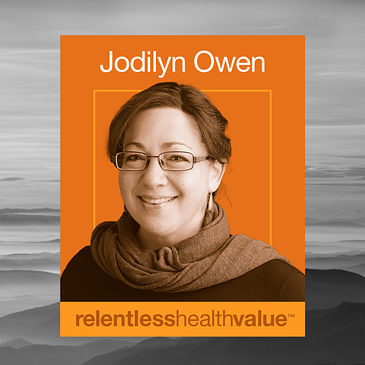For a full transcript of this episode, click here.
I want to kick off this show with a clip from episode 415 with Rob Andrews, wherein he so very eloquently sets the stage here:
We think that one of the core problems here is that too many intermediaries and providers in the system, their compensation is not in any way dependent on the outcome. So, let’s think about this NICU baby problem again. Looking at the hospital system—and I’m not at all implying or suggesting any hospital system tries to do this—but I think it is clear that they actually benefit commercially from more babies spending more days in the NICU. NICU’s usually a pretty good margin business. It’s expensive. Lots of money is paid, and margins run pretty well there. So, I don’t think there’s a hospital system in the country that intentionally says, “Oh, good … let’s go out and try to fill up the NICU every day.” But when it gets filled up, they benefit.
On the other hand, if the hospital invests significantly in early effective intervention prenatal or even pre-pregnancy, there’s no upside to that financially. They don’t get rewarded for that. They might win an award from some magazine for best practices, but their margin suffers.
Then if you look at the intermediaries, the carriers, and PBMs [pharmacy benefit managers], their outcomes are irrelevant to their performance. If an employee of a self-insured employer has a significant risk prenatal or pre-pregnancy and the carrier does a great job identifying that problem and solving it, they make the same amount of money off that patient or that consumer that they would if they did nothing. So, it’s a bit harsh to say this, but the carriers make the same amount of money if every child is born healthy and there’s not a day spent in the NICU as if they do if every child’s born with severe crises and winds up in the NICU.
It's not a big mystery in the US economy that people do what you pay them to do. And if you have a system, which we do now, where the case of maternal health, diabetes management, musculoskeletal management, cholesterol and cardiac management … when you have a system where many, many players in the system, at best, make the same amount of money for bad outcomes as they do for good ones and, at worst, they prosper from the bad outcomes, that explains the problem.
So, is this show about improving maternal health outcomes in the US, where it is relatively deadly to have a baby compared to other industrialized nations? Yes. But improving maternal health is also a great case study for what needs to be done to just improve health. You could apply it to primary care. You could apply it to chronic care management. It is a fairly broad-spectrum solution, as it were.
I’m thinking right now about how Dave Chase, co-founder of Health Rosetta—how does he put it?—he says every big problem in healthcare already has been solved. The existing challenge is how to massively replicate proven solutions. So, yeah … keep that in mind when we talk about what Jodilyn Owen has accomplished with her team in Washington State with their birth and health center. Also, as you consider how you might replicate, keep in mind the struggles she has faced getting contracts from self-insured employers or payers to pay her clinic and a very interesting encounter she had with a VC/PE (venture capital/private equity) funded maternal health start-up. It’s just interesting where the money is flowing and where it’s not flowing.
But let’s talk about Jodilyn’s clinic’s outcomes. Their zip code is one of the most diverse in the nation. There are 79 languages spoken. There is lots of social determinants of health going on. It is a medically underserved area. It is a federally designated provider shortage area. So, this community has every right to have horrible outcomes.
Meanwhile, nearby, there is a wealthy community. In that zip code, they live 17 years longer than in Jodilyn’s clinic’s zip code.
But if you compare the outcomes that Jodilyn’s clinic has compared to the outcomes in the hospital in that fancy neighborhood, Jodilyn’s group has far less cesarean rates, far less NICU admissions, far less incidence of gestational diabetes, far quicker access to treatment for hypertension.
You might be wondering how much their birth bundle costs that they are having trouble getting most payers except one to pay for and getting no VC dollars or funding at all. They’re charging $5000 to $7000. So, let’s just say $5000 to $7000 compared to … what does one NICU admission cost? So, yeah … this is an exact example of what Rob Andrews was talking about. An EXACT example.
So yeah, enjoy this episode; it’s as heartwarming and actionable as it is frustrating. And if you are a payer or self-insured employer in South Seattle, please give this clinic a contract.
Not to drop a major spoiler alert here, but you know what Jodilyn’s “secret sauce” is? Nuances for sure, but bottom line, it’s about trust. It’s about relationships. It’s about listening to the patient. It’s being part of the local community.
If you’re shocked right now, raise your hand. There’s gonna be no one with their hand raised. How many times do we have to figure this out?
Jodilyn Owen is the clinical director of the Rainier Valley Birth & Health Center. She is a licensed midwife along with a bunch of other credentials.
Also mentioned in this episode are Rob Andrews; Dave Chase; Vivek Garg, MD, MBA; and Larry Bauer.
You can learn more by emailing Jodilyn at jodilyno@myrvcc.org.
You can also connect with her on LinkedIn.

Jodilyn built her practice around the idea that parents know themselves and their babies best, and her direct patient work is designed to promote this first relationship. She provides individualized, gentle, and holistic pregnancy, birth, and postpartum care for families planning a home, birth center, or hospital birth.
Jodilyn is currently director of clinical partnerships and staff midwife at the nonprofit–for purpose Rainier Valley Birth & Health Center. She provides infrastructure development, guides clinical programs and partnerships, and supports students from multiple university health professions and public health programs at all levels from high school through doctoral studies.
07:12 How much cost savings is there when you avoid a NICU admission?
09:43 How is “slow care” feasible among an ob-gyn shortage in many communities?
10:42 “Start people at the risk that they are appropriate for.”
11:37 EP407 and Summer Shorts 3 with Vivek Garg, MD, MBA.
13:50 “To effect change, we have to unwind what has been wound so tightly and so carefully through medical … education.”
14:13 “It’s not a people problem; it’s a system problem.”
18:46 What does relationship-based care mean?
22:32 “Everything in pregnancy at least is a trend.”
28:01 How does Jodilyn’s practice work with payers?
31:08 EP409 with Larry Bauer, MSW, MEd.
32:24 Why is it important to address the root of this problem in the education space?
You can learn more by emailing Jodilyn at jodilyno@myrvcc.org.
You can also connect with her on LinkedIn.
Recent past interviews:
Click a guest’s name for their latest RHV episode!
Ge Bai, Andreas Mang, Karen Root (Encore! EP381), Mark Cuban and Ferrin Williams, Dan Mendelson (Encore! EP385), Josh Berlin, Dr Adam Brown, Rob Andrews, Justina Lehman, Dr Will Shrank


